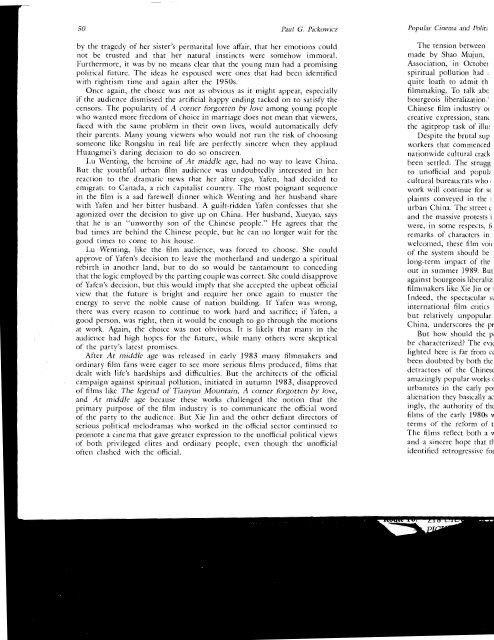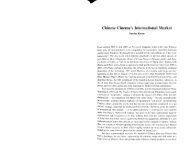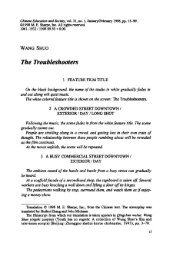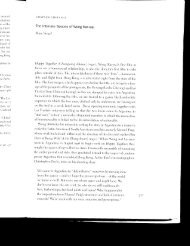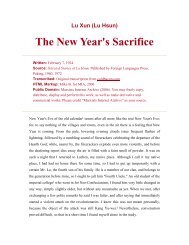soPaul G. Pickowicz<strong>Popular</strong> <strong>C<strong>in</strong>ema</strong> <strong>and</strong> PolitJby the tragedy of her sister's permarital love affair, that her emotions couldnot be trusted <strong>and</strong> that her natural <strong>in</strong>st<strong>in</strong>cts were somehow immoral.Furthermore, it was by no means clear that the young man had a promis<strong>in</strong>gpolitical future. The ideas he espoused were ones that had been identifiedwith rightism time <strong>and</strong> aga<strong>in</strong> after the 1950s.Once aga<strong>in</strong>, the choice was not as obvious as it might appear, especiallyif the audience dismissed the artificial happy end<strong>in</strong>g tacked on to satisfy thecensors. The popularity of A corner forgotten by love among young peoplewho wanted more freedom of choice <strong>in</strong> marriage does not mean that viewers,faced with the same problem <strong>in</strong> their own lives, would automatically defytheir parents. Many young viewers who would not run the risk of choos<strong>in</strong>gsomeone like Rongshu <strong>in</strong> real life are perfectly s<strong>in</strong>cere when they applaudHuangmci's dar<strong>in</strong>g decision to do so onscrecn.Lu Went<strong>in</strong>g, the hero<strong>in</strong>e of At middle age, had no way to leave Ch<strong>in</strong>a.But the youthful urban film audience was undoubtedly <strong>in</strong>terested <strong>in</strong> herreaction to the dramatic news that her alter ego, Yafen, had decided toemigrate: to Canada, a rich capitalist country. The most poignant sequence<strong>in</strong> the film is a sad farewell d<strong>in</strong>ner which Went<strong>in</strong>g <strong>and</strong> her husb<strong>and</strong> sharewith Yafen <strong>and</strong> her bitter husb<strong>and</strong>. A guilt-ridden Yafen confesses that sheagonized over the decision to give up on Ch<strong>in</strong>a. Her husb<strong>and</strong>, Xueyao, saysthat he is an "unworthy son of the Ch<strong>in</strong>ese people." He agrees that thebad times arc beh<strong>in</strong>d the Ch<strong>in</strong>ese people, but he can no longer wait for thegood times to come to his house.Lu Went<strong>in</strong>g, like the film audience, was forced to choose. She couldapprove of Yafen's decision to leave the motherl<strong>and</strong> <strong>and</strong> undergo a spiritualrebirth <strong>in</strong> another l<strong>and</strong>, but to do so would be tantamount to conced<strong>in</strong>gthat the logic employed by the part<strong>in</strong>g couple was correct. She could disapproveof Yatcn's decision, but this would imply that she accepted the upbeat officialview that the future is bright <strong>and</strong> require her once aga<strong>in</strong> to muster theenergy to serve the noble cause of nation build<strong>in</strong>g. If Yafen was wrong,there was every reason to cont<strong>in</strong>ue to work hard <strong>and</strong> sacrifice; if Yafen, agood person, was right, then it would be enough to go through the motionsat work. Aga<strong>in</strong>, the choice was not obvious. It is likely that many <strong>in</strong> theaudience had high hopes for the future, while many others were skepticalof the party's latest promises.After At middle age was released <strong>in</strong> early 1983 many filmmakers <strong>and</strong>ord<strong>in</strong>ary film fans were eager to see more serious films produced, films thatdealt with life's hardships <strong>and</strong> difficulties. But the architects of the officialcampaign aga<strong>in</strong>st spiritual pollution, <strong>in</strong>itiated <strong>in</strong> autumn 1983, disapprovedof films like The legend of Tianyun Mounta<strong>in</strong>, A corner forgotten by love,<strong>and</strong> At middle age because these works challenged the notion that theprimary purpose of the film <strong>in</strong>dustry is to communicate the official wordof the party to the audience. But Xie J<strong>in</strong> <strong>and</strong> the other defiant directors ofserious political melodramas who worked <strong>in</strong> the official sector cont<strong>in</strong>ued topromote a c<strong>in</strong>ema that gave greater expression to the unofficial political viewsof both privileged elites <strong>and</strong> ord<strong>in</strong>ary people, even though the unofficialoften clashed with the official.The tension betweenmade by Shao Mujun,Association, <strong>in</strong> Octobe1spiritual pollution hadquite loath to admit thfilmmak<strong>in</strong>g. To talk abcbourgeois liberalization.'Ch<strong>in</strong>ese film <strong>in</strong>dustry 01creative expression, stancthe agitprop task of illu:Despite the brutal supworkers that commencednationwide cultural crackbeen settled. The struggto unofficial <strong>and</strong> popul
Paul G. Pickowiczhat her emotions couldere somehow immoral.g man had a promis<strong>in</strong>ghat had been identifiedight appear, especiallytacked on to satisfy thevc among young peoples not mean that viewers,uld automatically defyun the risk of choos<strong>in</strong>gere when they applaudno way to leave Ch<strong>in</strong>a.redly <strong>in</strong>terested <strong>in</strong> herYafen, had decided toost poignant sequence<strong>and</strong> her husb<strong>and</strong> share'afen confesses that shehusb<strong>and</strong>, Xueyao, sayse." He agrees that theno longer wait for theto choose. She couldnd undergo a spiritualtamount to conced<strong>in</strong>gct. She could disapprovepted the upbeat officiale aga<strong>in</strong> to muster the~· If Yafen was wrong,d sacrifice; if Yafen, ao through the motionsikely that many <strong>in</strong> they others were skepticalmany filmmakers <strong>and</strong>s produced, films thatrchitects of the officialmn 1983, disapprovedJrner forgotten by lm·c,d the notion that thenicate the official wordher defiant directors ofial sector cont<strong>in</strong>ued tonofficial political viewsthough the unofficial<strong>Popular</strong> <strong>C<strong>in</strong>ema</strong> <strong>and</strong> <strong>Political</strong> <strong>Thought</strong> 51The tension between these two tendencies was reflected <strong>in</strong> public remarksmade by Shao Mujun, a senior researcher affiliated with the Ch<strong>in</strong>a FilmAssociation, <strong>in</strong> October 1984, after the storm of the campaign aga<strong>in</strong>stspiritual pollution had subsided. "Some people here," Shao <strong>in</strong>sisted, "arequite loath to admit that there is a problem of freedom of expression <strong>in</strong>filmmak<strong>in</strong>g. To talk about it is even considered a reactionary tendency ofbourgeois liberalization." Shao boldly asserted that "a ma<strong>in</strong> target of theCh<strong>in</strong>ese film <strong>in</strong>dustry on its road to reform is to fight for full freedom ofcreative expression, st<strong>and</strong> aga<strong>in</strong>st 'crude <strong>in</strong>terference,' <strong>and</strong> break away fromthe agitprop task of illustrat<strong>in</strong>g current policies. " 24Despite the brutal suppression of alienated students <strong>and</strong> disaffected youngworkers that commenced <strong>in</strong> June 1989, <strong>and</strong> the subsequent launch<strong>in</strong>g of anationwide cultural crackdown, none of the issues raised <strong>in</strong> this chapter havebeen settled. The struggle between directors who want to give expressionto unofficial <strong>and</strong> popular political criticisms of the state <strong>and</strong> party <strong>and</strong>cultural bureaucrats who dem<strong>and</strong> that filmmakers engage <strong>in</strong> political agitpropwork will cont<strong>in</strong>ue for some time. Furthermore, the popular political compla<strong>in</strong>tsconveyed <strong>in</strong> the serious films of the early 1980s are still heard <strong>in</strong>urban Ch<strong>in</strong>a. The street demonstrations of disgruntled students <strong>in</strong> late 1986<strong>and</strong> the massive protests <strong>in</strong> Tiananmen Square <strong>and</strong> elsewhere <strong>in</strong> spr<strong>in</strong>g 1989were, <strong>in</strong> some respects, foreshadowed <strong>in</strong> the sometimes bitter speeches <strong>and</strong>remarks of characters <strong>in</strong> the films discussed here. Economic reforms werewelcomed, these film voices seemed to be say<strong>in</strong>g, but a political renovationof the system should be undertaken as well. It is too early to evaluate thelong-term impact of the crush<strong>in</strong>g political <strong>and</strong> cultural repression carriedout <strong>in</strong> summer 1989. But we do know that the short-lived official campaignaga<strong>in</strong>st bourgeois liberalization launched <strong>in</strong> early 1987 did little to discouragefilmmakers like Xie J<strong>in</strong> or to dampen popular enthusiasm for political reform.Indeed, the spectacular success of Xie J<strong>in</strong>'s Hibiscus town <strong>in</strong> 1987, when<strong>in</strong>ternational film critics were focus<strong>in</strong>g their attention on the imag<strong>in</strong>ativebut relatively unpopular "new wave" of Fifth Generation filmmakers <strong>in</strong>Ch<strong>in</strong>a, underscores the profound popular appeal of political melodramas. 25But how should the political thought of young <strong>and</strong> educated urbanitesbe characterized? The evidence provided by the popular film material highlightedhere is far from conclusive, but it suggests answers that would havebeen doubted by both the most uncritical supporters <strong>and</strong> the most vehementdetractors of the Ch<strong>in</strong>ese Communist party <strong>in</strong> the early 1980s. If theseamaz<strong>in</strong>gly popular works offer any h<strong>in</strong>ts about the political thought of youngurbanites <strong>in</strong> the early post-<strong>Mao</strong> years, it is that despite their self-pity <strong>and</strong>alienation they basically accepted the system <strong>and</strong> recognized, however grudg<strong>in</strong>gly,the authority of the party <strong>and</strong> state. The ma<strong>in</strong> audience for Xie J<strong>in</strong>'sfilms of the early 1980s were people like himself who thought primarily <strong>in</strong>terms of the reform of the party <strong>and</strong> state rather than their elim<strong>in</strong>ation.The films reflect both a widespread popular disillusionment with the party<strong>and</strong> a s<strong>in</strong>cere hope that the party will be able to reform itself. These worksidentified retrogressive forces that had to be elim<strong>in</strong>ated from the party <strong>and</strong>


